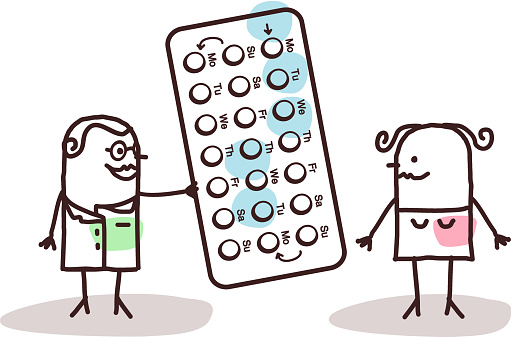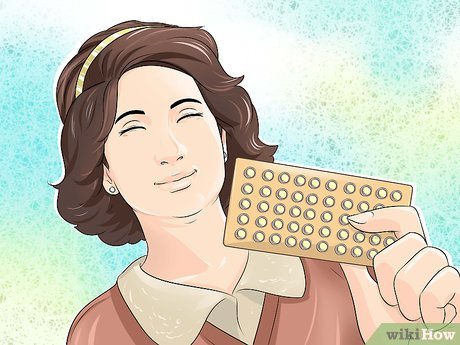Comparing The 2 types of Hormonal Birth Control Pills: Which one is the best option for you?
Oral Hormone-based birth control pills (BCPs) are an effective and noninvasive way to avoid pregnancy when engaging in unprotected sex. (They do not offer any protection against STI’s, STD’s or HIV) They also help in reducing acne and menstrual cramps and regulate your preexisting cycle. However, there are multiple types of pills available in the market, and it can be difficult to decide what is the right option for you.

What you’ll find in this article:
This article provides a brief comparative overview of 2 types of hormonal oral contraceptive pills:
- With only progesterone/ Progestin (Progestin is an artificial form of progesterone that is used for medical purposes.
- With both estrogen and progesterone (combined hormonal pills)
Your usual menstrual cycle will resume 4-6 months after one halts the usage of any of these pills.
Disclaimer: Always remember that you should always consult a doctor before taking BCPs; keeping in mind your current physical state, menstrual symptoms, and any pre-existing health conditions you may have. You should educate yourself on the pros and cons of taking hormonal pills, and their possible side effects, and how they interact with other medications you may be taking.
Note: This blog contains introductory information alone and is not intended as a substitute for qualified medical advice. You can also refer to this link for the Manual on Oral Contraceptive Pills created by the Family Planning Division of the Ministry of Health and Family Welfare, Government of India for additional, government certified information.

Progestin only pill
Also known as the mini-pill, the mg of progestin contained in this is less as compared to the mg of progestin in a combination pill.
How do they work?
The effects it has on your body are that in addition to suppressing ovulation, it
(i) thins the endometrium (the uterus lining)
(ii) thickens cervical mucus- creating barriers that do not allow the sperm to proceed up the vaginal canal towards the egg.
It should be taken religiously at the same time daily, for maximum effectiveness. If you miss your dosage time by 3+ hours, it is advisable to use an additional method of contraception, like condoms for the next two days.
Benefits:
(i) It is safe to use while breastfeeding and can be used in the postpartum period. As they don’t contain estrogen, they are much less likely to cause the side effects listed below, as compared to combination pills.
(ii) They are safer for women with a history of smoking or heart disease.
(iii)They also tend to work quicker that combination pills, i.e., you will be able to engage in unprotected sex after taking 2 pills only, a 48 hour periods.
Comparison:
Unlike the combination pill, the mini pill does not increase the risk of heart attacks or high blood pressure and is safe to use even with pre-existing heart conditions.
Side Effects:
You may bleed unpredictably on this pill from time to time. One may also experience breast tenderness, acne, depression, weight gain, mood changes, headaches and nausea, which are rare. It should not be used by women suffering from a history of breast cancer or lupus.
Advised Dosage:
This pill comes in packs of 28 and one pack should be taken immediately after another ends, without a break. Each pill in the pack is active, unlike combination pills that contain a week’s worth of inactive/placebo pills.
- Examples of Brands sold in India: Camilla, Norethindrone, Heather.

Combined Hormonal Pills (contains both Progestin and Estrogen)
Such pills contain combinations of both estrogen (normally ethinyl estradiol) and progestin. Packs come in 2 types of packs, 28- or 21-day packs.
How do they work?
Both hormones signal to the pituitary gland to prevent it from producing ovulation inducing hormones. As mentioned above, progestin acts upon your cervical mucus and endometrium. If you begin your pills within 5 days after your period ends, you are protected from pregnancy right away. If you begin taking pills at any other time, you must use it for 7 days before you are completely protected from pregnancy.
Benefits:
You don’t have to take it at the same time each day, but once a day is a must.
How to skip your period:
If you have a special occasion, you can choose to skip the last week of the month in the 28-day packs, where you get your period. Just skip the last 7 pills and skip to the next pack’s active pills. Some women may experience slight spotting when they skip their period.
Comparison:
As compared to progestin- only pills, women who take combination pills may be at an increased risk of heart attack, stroke, and blood clots.
Side Effects:
You may experience headaches, mood swings, decreased libido, headaches, irritability, slight spotting, etc, however these are generally slight and may halt after your body gets used to taking the pill.
Advised Dosage for 28-day packs:
This pill must be taken once a day for 28 days. The last 7 pills are known as placebo pills as they don’t contain any hormones. They are intended as reminders so you don’t forget to take your pills and may contain mineral supplements. During this last week, you will still be protected from pregnancy.
Advised Dosage for 21-day packs:
These contain 21 active pills. You must take them for 21 days, then take no pills for 7 days, and then begin the next pack. During this last week, you may get your period and you will still be protected from pregnancy.

Conclusion
There have been many success stories, like the one linked here, of Indian women successfully using Oral contraceptives for Family Planning exercises. Many non-hormonal options are also available for contraception, like barrier methods (condoms) and IUDs (Copper T). One should carefully decide what method is best for them, based on professional medical advice.
Cover Illustration: National Communication Association
Author

